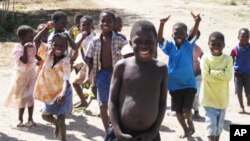It’s seven o’clock in the morning. Downtown Blantyre is bustling with people on their way to work. The day has also just begun for 14-year-old Funsani Chibwana. He wears tattered clothes, and his appeals are designed to waken the conscience of people walking by.
Chibwana is one of 3,000 street children who beg in Malawi’s commercial capital of Blantyre. His parents died two years ago.
He says he began living on the streets just a week after the death of his mother.
“Lack of food and other basic amenities forced me to leave the village and start a new life as a street beggar in the city of Blantyre. I used to come here occasionally to beg even when my parents were alive because food was scarce in our family. So when my parents died I decided to go into full time street begging," says Chibwana.
Chibwana says he also needed to help his frail grandmother, who assumed the responsibility of taking care of him and his two young siblings.
Studies have cited grinding poverty and hunger as the main reason that drives children onto the street for begging. Statistics show that over half of Malawians live below poverty line of $2 a day, while 22 percent of them are ultra poor, living below 10 cents a day, or 22 [Malawian] Kwacha.
Maxwell Matewere is the executive of the Eye of the Child, one of the NGOs taking part in the campaign. He says these children are a threat to peace, order and good governance.
“Most of the street children have gone into crime. They have been found stealing women’s handbags. Most of them have been taken into prison because they have been involved in crime. Some of the have been defiled on the streets and sodomized," Matewere explains.
Matewere says taking them off the streets is the only way to provide a protective environment.
The initiative, Matewere says, seeks to put some of the poor children into reform centers and return others to their homes. It’s hoped that then they will attend school and become model citizens.
He says in reformatories, some will learn skills like carpentry, brick laying and tailoring.
But critics scoff at the plan, saying rehabilitation is useless unless one addresses the underlying reasons children are on the streets, namely grinding poverty, broken families and HIV/AIDS.
Matewere says those who resort to begging will be treated as criminals and parents will be punished in line with the new Child Care, Protection and Justice Law. It penalizes parents who send children into the streets to beg.
But he did say the main challenge is that some children go into hiding once they learn they may be picked up.
Statistics from the Social Welfare Department show that the campaign has helped reduce the number of street children. For example, in Blantyre the number of street children has dropped by a third, from 3,000 to 1000. The same is the case with the cities of Lilongwe and Mzuzu.




